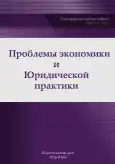Legislative Practice of State Support of the Regions as a Factor in the Development of Tourist Territories
- Authors: Battalova L.M.1, Krasheninnikov S.V.1
-
Affiliations:
- Financial University under the Government of the Russian Federation
- Issue: Vol 18, No 3 (2022)
- Pages: 208-216
- Section: Articles
- URL: https://journal-vniispk.ru/2541-8025/article/view/147142
- ID: 147142
Cite item
Abstract
Full Text
##article.viewOnOriginalSite##About the authors
Linara M. Battalova
Financial University under the Government of the Russian Federation
Email: linara_b@mail.ru
Cand. Sci. (Law), Associate Professor Moscow, Russian Federation
Sergey V. Krasheninnikov
Financial University under the Government of the Russian Federation
Email: appravo@yandex.ru
Cand. Sci. (Law), Associate Professor Moscow, Russian Federation
References
- Federal Law No. 132-FZ of November 24, 1996 «On the Fundamentals of Tourist Activities in the Russian Federation». Approved by the State Duma on October 4, 1996 -Electronic resource. Access mode: http://www.consultant.ru/
- Federal Law No. 116-FZ of July 22, 2005 «On Special Economic Zones in the Russian Federation». Approved by the State Duma on July 8, 2005 -Electronic resource. Access mode: http://www.consultant.ru/
- Federal Law No. 244-FZ of December 29, 2006 «On State Regulation of Organizing and Conducting Gambling and on Amendments to Certain Legislative Acts of the Russian Federation». Approved by the State Duma on December 20, 2006 -Electronic resource. Access mode: http://www.consultant.ru/
- Federal Law No. 224-FZ of July 3, 2015 «On Public-Private Partnership, Municipal-Private Partnership in the Russian Federation and Amendments to Certain Legislative Acts of the Russian Federation». Approved by the State Duma on July 1, 2015 -Electronic resource. Access mode: http://www.consultant.ru/
- Federal Law No. 115-FZ of July 21, 2005 «On Concession Agreements». Approved by the State Duma on July 6, 2005 Approved by the State Duma on July 6, 2005 -Electronic resource. Access mode: http://www.consultant.ru/
- Federal Law No. 377-FZ of November 29, 2014 «On the Development of the Republic of Crimea and the Federal City of Sevastopol and the Free Economic Zone on the Territories of the Republic of Crimea and the Federal City of Sevastopol». Approved by the State Duma on November 21, 2014 -Electronic resource. Access mode: http://www.consultant.ru/.
- Federal Law No. 488-FZ dated December 31, 2014 «On Industrial Policy in the Russian Federation». Approved by the State Duma on December 16, 2014» -Electronic resource. Access mode: http://www.consultant.ru/
- The Tax Code of the Russian Federation. Part II of 05.08.2000 No. 117-FZ. Adopted by the State Duma of the Federal Assembly of the Russian Federation on 07/19/2000 - Electronic resource. Access mode: http://www.consultant.ru/
- Decree of the Government of the Russian Federation of August 20, 2015 No. 870 «On the content, composition, procedure for developing and approving the strategy for the spatial development of the Russian Federation, as well as on the procedure for monitoring and controlling its implementation» -Electronic resource. Access mode: https://www. base.garant.ru/71170676/
- Decree of the Government of the Russian Federation No. 207-r dated February 13, 2019 «On Approval of the Spatial Development Strategy of the Russian Federation for the period up to 2025» -Electronic resource. Access mode: http://www.consultant.ru/
- Decree of the President of the Russian Federation of January 16, 2017 No. 13 «On Approval of the Fundamentals of the State Policy of Regional Development of the Russian Federation for the period up to 2025» -Electronic resource. Access mode: https://www. base.garant.ru/71170676/
- Strategy for the development of tourism in the Russian Federation for the period up to 2035. Approved by order of the Government of the Russian Federation No. 2129-r on September 20, 2019 -Electronic resource. Access mode: http://www.consultant.ru/
- Andreev A.N., Bukharova M.M., Danilov L.V. et al. Business Navigator for Special Economic Zones of Russia, 2020//Issue 4. Ed. Shpilenko A.V. Association for the Development of Clusters and Technoparks of Russia. -M.: AKIT RF, 2020. -203 p.
- ATOR asked the government to consider a new package of measures to support the tourism industry for 2021//Association of Tour Operators. Official site -December 24, 2020 -Electronic resource. Access mode: https://www.atorus.ru/news/press-centre/new/53774.html
- Battalova L.M. Tourist region (destination) as an integral element of civil law relations in the tourism system // Gaps in Russian legislation. -2022, No. 1. -p. 52-58.
- Ibrogimova R.A. The role of tourist and recreational potential in the socio-economic development of the region-diss. cand. eq. Sciences -Dushan-be, 2021. -p. 189
- Zorin I.V. Destination in the context of UNESCO: teaching materials for the course «Tourist destinations» / A. Zorin, I. Zorin. -M.: RMAT, 2011. -p. 68-72.
- Kruzhalin V.I. Geography of tourism: textbook / V.I. Kruzhalin, N.S. Mironenko, N.V. Siegern-Korn, N.V. Shabalin. -M.: Federal Agency for Tourism, 2014. -336 p.
- SEZ tourist-recreational type//Official website of the Ministry of Economic Development of the Russian Federation. -Electronic resource. Access mode: https://www.economy.gov.ru/material/directions/
- Sachenok L.I. Problematic aspects of the legal regulation of tourism activities: directions for their solution//Scientific notes of the Crimean Federal University named after V.I. Vernadsky. Legal Sciences. -2020, v. 6 (72), No. 4.-p. 437-449.
Supplementary files








